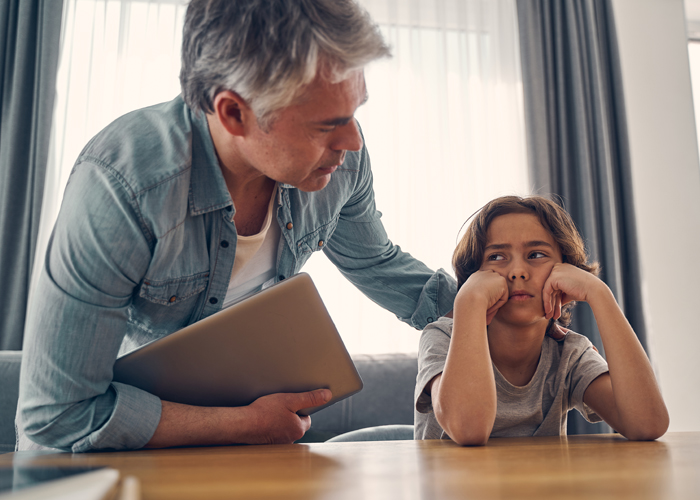The Anxious Parent of the Anxious Child
I like to say that I hold several Google University degrees. I am an incessant, constant, chronic researcher. I cannot seem to ever learn enough or have my curiosity quenched. What’s that beautiful flower growing on the side of the highway? What ever happened to that child actor from that one movie I saw in the early 90’s? How common is my birthday? And did anyone ever discover what was on page 47 in National Treasure 2?
But for as many interesting tidbits and factoids I’m able to find that feed conversation, my vast and varied browser history also feeds a very real struggle – anxiety. When answers to questions are a few finger taps away, the temptation to search everything is too great. Why am I having a headache on this side of my head? Why does my elbow hurt? What does it mean when I have this recurring dream? Why does my child behave this way? Is their quirk or struggle a symptom of something larger? What are the criteria for these specific disorders and struggles, and how many does my child meet? What is wrong, and how scared should I be?
When you’re an anxious parent you already worry about almost everything. When you’re parenting an anxious child, there are legitimate worries and fears that are dealt with on a daily basis. When you’re the anxious parent of an anxious child, racing heartbeats, stomach aches, lack of sleep, and just plain terror can overtake you and convince you that there is an unnamed dragon waiting just around the corner, a diagnosis or disorder that you can’t quite put a label to but a fear you can very much feel.
One of the most triggering and driving emotions of irrational fear and anxiety is the sensation of the unknown. That’s what drives me to research every ache and pain, in an attempt to head off some degenerative or deadly disease by identifying it quickly. Not knowing what is happening leaves us unsteady and fearful, but imagining what could be happening is what really drives us to the dark and terrifying places. The places where fear silences reason and we are so terrified of the unknown that we cling to whatever explanation we can reach in an attempt to catch some footing. This is where we are when we look at our anxious child and use our Google University degrees to “diagnose” our children.
There’s been an overwhelming trend in the last several years towards pathologizing everything, placing a name or label or diagnosis on every behavior of childhood or intense emotion of adulthood. There are dozens of theories to discuss as to why the tendency has leaned more and more towards labeling every quirk or struggle, but for the sake of this post, from the perspective of an anxious parent, the desire comes from a need to understand, anticipate, and have something we can control.
Related: The Anxious Parent of the Anxious Child | Using Social Stories, The Lies Anxiety Tells You
Being able to comfort myself that my child’s behaviors are a result of some disorder removes the fear of the unknown when I watch them struggle and have no idea why. And while no one wants their child to suffer or need any type of intervention, the fear of what our child could be struggling with is greater than the fear of what a diagnosis means. The unknown is far worse than the pathologized. Disorders are more comforting than the undetermined.
Yes, especially when dealing with anxious families, there often are disorders to consider and adapt to, and identifying them and advocating for your child is an enormous piece of mental wellness. You should always raise concerns about behaviors or intrusive thoughts with your child’s doctor, and push for more detailed attention when you feel that concerns are being dismissed. But, when viewing your anxious child through your own anxious lens, it is important not to lose yourself in the flood of possible diagnoses. Remind yourself that sometimes quirks are just quirks. Sometimes what you’re convinced is a herd of zebras is really just a routine herd of horses. Not every behavior or meltdown or classroom struggle is a symptom of something greater going on. Not everything is a disorder.
I can feel some of the ruffled feathers already, because without parents advocating children in need would almost never receive services or care for their very real struggles. This is absolutely true. I wish someone had recognized the signs of the severe anxiety I was experiencing as a child and had thought to seek out a professional opinion. I’m not encouraging parents to ignore questionable behavior or gut feelings that direct you towards finding help. I’m reminding anxious parents that anxiety is not always a sound textbook to draw from when worrying about your child.
The anxious mind is not a typical mind. The anxious mind can make enormous leaps in reason, starting in one arena and landing in an entirely different one. The anxious mind can witness a quirk and see an entire fictitious path leading forward that only leads to diagnosis, pain, and lifelong struggle. Heck, the anxious mind can see a dozen of those paths.
Related: 2E Or Not 2E? That is the Question, RLL #86: All About Anxiety with Dr. Dan Peters
An anxious parent, who is themselves coping with a very real disorder, witnessing their anxious child struggle with their own real disorder, can run through a hundred scenarios with every behavior they witness. The fear can take over and control is suddenly up for grabs, so we scramble to Google, observe, research, ask, anything we can do to feel useful and informed and prepared for whatever fate awaits our child. While plenty could call this good parenting, and I wouldn’t argue against that, being quick to pathologize every behavior and assign a diagnosis to every stumble is driven by irrational fear, by anxiety itself, and anxiety is known to not always whisper truths to our terrified minds.
As the anxious parent of an anxious child, I have to learn to contain my worry spirals and my fervent Google searches. I no longer keep a DSM on my nightstand for quick reference. If a behavior is suspect, I make note of it, along with the circumstances surrounding it – was she hungry? was he tired? was he being irritated by his siblings or reacting from sensory overwhelm? Make note of each instance and compare the circumstances and settings. Observe before you research. Take note before you diagnose. Approach their behaviors from a place of interest, not fear. Rather than approaching our children’s behavior as a hypothesis we’re trying to prove, give it some time to draw exegetical information from.
The anxious mind can be a scary one, and the anxious experience can often feel like a hopeless one. Your understanding and empathy as an anxious parent is of enormous help to an anxious child, but it is important to keep in mind that your help, empathy, and enthusiasm should not be drawn from the anxiety itself. Anxiety lies to you, convinces you of the worst, so try not to allow anxiety to be the driving force behind seeking help for your child. Anxiety will tell you that something is wrong, everything is wrong, no one else knows what’s wrong. Anxiety will tell you there’s a disease, a disorder, a painful path before your child. Anxiety will tell you those behaviors aren’t normal, and in an attempt to grasp at some kind of control you end up losing your footing altogether. Anxiety will convince you that to love your child you must constantly worry for them, but what you must keep in mind as the anxious parent is that those fears and rushes to pathologize and label behavior, that enthusiasm driven by fear to find a disorder, more often than not, comes from the whispers of a disorder itself.
You are your anxious child’s greatest advocate. You do not need to be their worried diagnostician, too.




